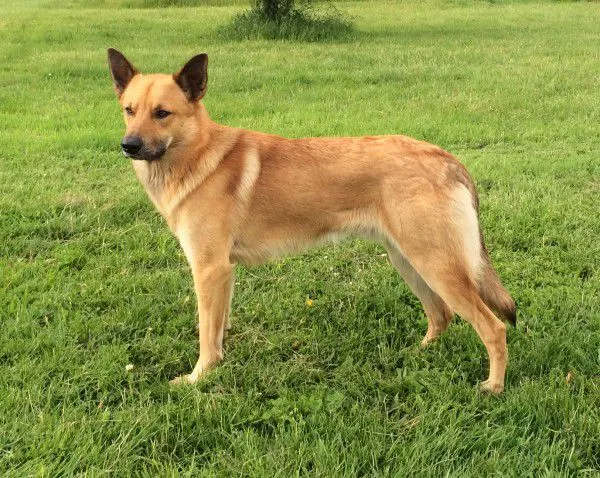Chinook Dog Breed Information:
Created in the White Mountains of New Hampshire, the Chinook dog breed made its name on Admiral Byrd’s first Antarctic expedition in 1928. These days they’re multipurpose dogs who are happy hiking, competing in agility and other dog sports, pulling a sled or other conveyance, and playing with the kids.
Chinook Dog Group: Working Dogs.
Chinook Height: 21 to 27 inches tall at the shoulder.
Chinook Weight: 55 to 70 pounds.
Chinook Life Span: 12 to 15 years.
More About This Dog Breed:
Chinooks have a gentle, even temperament and are rarely shy or aggressive. Chinooks need 30 to 60 minutes of daily exercise. They enjoy hiking, jogging, and pulling, whether what's behind them is a sled, wagon, or person on skis or skates.Chinooks are not barkers but can be talkative, whining and "woo-wooing" to express their opinions.
Chinook History:
When Arthur Walden bred a farm dog with a husky on his Wonalancet, New Hampshire farm, he little knew that the result would be a legendary line of sled dogs.
Walden, who had been a dog driver in Alaska for a time, brought the sport of sled dog racing to New England. One of the puppies from the aforementioned litter, named Chinook after the warm winds that melt Alaska snows, stood out for his good looks, temperament, and working ability, and his puppies followed in his footprints.
When Admiral Byrd was planning his expedition to Antarctica in 1928, he called on Walden and his Chinook dogs for transport. The original Chinook was part of the team.
The Byrd expedition was a success, with one terrible exception: Chinook, 12 years old by then, wandered off and was never found. In the famous sled dog's honor, the name Chinook Trail was given to a portion of Route 113A that led to Chinook's hometown in New Hampshire.
Walden retired after his adventures in Antarctica and passed on the job of taking care of the breed to Milton and Eva Seeley and Julia Lombard. Then Perry and Honey Greene took over, eventually becoming the only people to breed the dogs.
Chinook Size:
Males stand 23 to 27 inches at the shoulder and weigh an average of 70 pounds. Females stand 21 to 25 inches at the shoulder and weigh an average of 55 pounds.
Chinook Personality:
The Chinook's temperament is described as calm, eager to please, and friendly. That said, he's not necessarily a hail fellow well met kind of dog. As with every dog, Chinooks need early socialization exposure to many different people, sights, sounds, and experiences. Enrolling him in a puppy kindergarten class is a great start.
Also Read This : All Dog Breeds - Names and Pictures | Complete List of Dog Profiles
Chinook Health:
Chinooks are generally healthy, but like all breeds, they can be subject to certain health conditions. Not all Chinooks will get any or all of these diseases:
Hip Dysplasia.
Cataracts.
Seizures.
Skin and coat.
Gastrointestinal issues.
Chinook Care:
Chinooks love their people and won't be happy living outdoors away from them. They're adaptable to most homes as long as their exercise needs are met. These active dogs need half an hour to an hour of daily exercise in the form of long walks and opportunities to run in large, safely enclosed areas. Underground electronic fencing is not recommended for this breed since Chinooks are so determined to get where they want to they'll ignore any shocks.
Chinook Feeding:
Recommended daily amount: 3 1/8 to 4 5/8 cups of a high-quality dog food daily, divided into two meals.
Chinook Coat Color And Grooming:
The double-coated Chinook has medium length hair with a thick, soft undercoat and a coarse outer coat. Chinooks who live in warm climates tend to have coats that are less dense than those of Chinooks in colder environments.
The Chinook's tawny coat ranges from light honey to reddish-gold. The dogs may have black markings on the inside corners of the eyes and dark tawny to black markings on the ears and muzzle. Outer hairs on the tail are sometimes black. Some Chinooks have buff markings on the cheeks, muzzle, throat, chest, breeches, toes, and belly.
Grooming provides you with an excellent opportunity to bond with your dog and to check his overall health. As you brush the coat or teeth, clean his ears and look for sores or other signs of irritation such as redness on the skin, mouth, feet, and ears. Eyes should be free of redness or discharge.
Chinook with Children And Other Pets:
A gentle and friendly Chinook can be a kid's best friend if they're brought up together. If your Chinook hasn't been socialized with kids, introduce the two slowly and calmly so the Chinook can become accustomed to the child at his own speed. The Chinook is a good team worker and usually gets along with other animals, cats included, but early socialization to other pets is still important.

